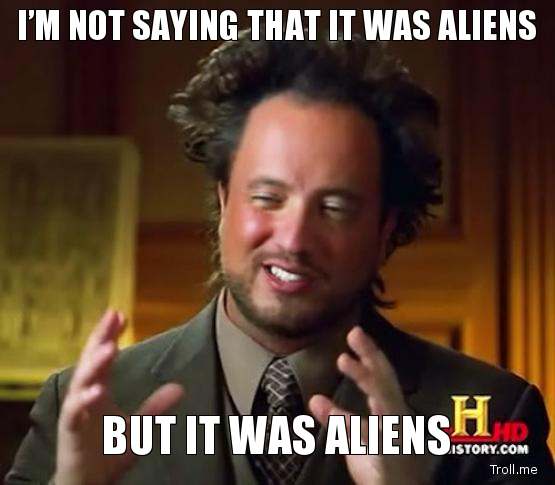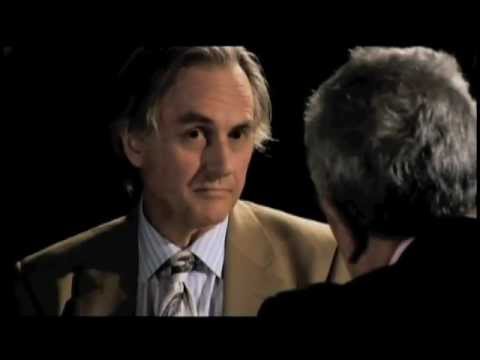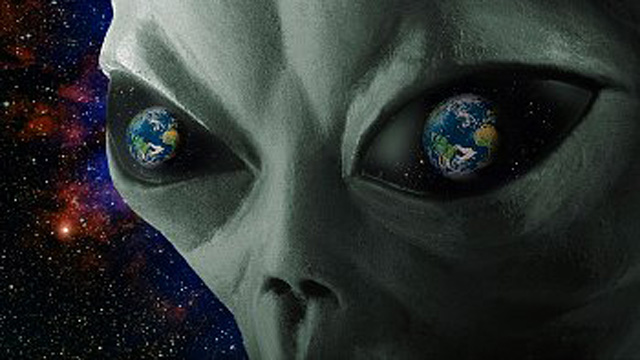Did aliens create life? For some, this question may be bizarre. However, I have recently been approached by more than one person inquiring about the possibility. Much of this inquiry stems from popular shows like Ancient Aliens or even Alien Encounters. Wild-haired personality Giorgio A. Tsoukalos popularized the view that many of the stories in the Bible involved personal encounters not with alien life forms rather than the divine.

It may surprise you to discover that even Richard Dawkins accepts the view of panspermia, that life was planted by alien life forms. In the movie Expelled, Ben Stein asks famed atheist Richard Dawkins the following:
“What do you think is the possibility that intelligent design might turn out to be…um…the answer to some of the issues in genetics…”
Dawkins replies, “Well it could come about in the following way: It could be that at some earlier time, somewhere in the universe, a civilization evolved by probably some kind of Darwinian means by a very high level of technology and designed a form of life they seeded on this type of planet. Um…now that is a possibility, and an intriguing possibility. And I suppose it’s possible that you might find evidence for that if you look at the details of biochemistry of biology you might find a signature of some form of designer. And that designer could be a higher intelligence from elsewhere in the universe. But that form of intelligence must come from an explicable process.”
Stein remarked, “Wait a minute! Richard Dawkins thought intelligent design might be a legitimate pursuit!”[1]

It seems like Dawkins does not have so much an issue with intelligent design as much as he does God. Are aliens the answer for life? Well, to give a complicated answer: no. I submit three reasons for why God’s existence is necessary rather than aliens to account for life.
God’s existence, rather than aliens, is necessary in being.
We must distinguish between necessary beings and contingent beings. This section may be a bit complicated for one who has not had experience in philosophy; for we deal with an ontological concept. Norman Geisler describes necessary beings as “one who cannot not exist (if it exists at all). But what cannot not exist has no potential for nonexistence. And what exists with no potential not to exist is Pure Existence.”[2] Philosophically complex? Yes. But, we can simplify the concept.
The issue comes down to this: something that absolutely is required to exist, exists. Let me explain the concept by the following illustration. You are reading these words on your device. These words are not random. They have meaning. Therefore, these words are contingent (dependent) upon the existence of an author (i.e. me). In this case, then, the words are contingent and my existence is necessary. The words prove my existence. However, when taken further, my existence is contingent upon the necessary existence of two other people (my parents). Because I exist, one can verifiably know that my parents exist. In this case, I am a contingent being and my parents are necessary beings. Push this far enough back to the first humans, then something has to account for all of life. God’s existence (an eternal, all-powerful, all-knowing, all-loving, conscious Mind) is necessitated by the existence of anything that exists.
God’s existence, rather than aliens, is necessary in creation.
This second point develops from the first. Whereas the first point engages the idea of ontology (the study of being), the second examines the question cosmologically. Even if aliens do exist, the creatures (sentient or not) would be contingent beings like ourselves as they would require an explanation for their existence as they would be finite creatures. Evidence continues to further prove the case that the universe if finite. Thus, anything that was born into this universe without a prior existent endowment and by sheer natural means is a limited creature.[3] If aliens are biological creatures born into this universe, then aliens are not the ultimate creators of life. They could never be. Therefore, aliens could not account for the creation of life and the universe as the finite universe requires an infinite, all-knowing, all-powerful, all-loving Mind. Sheer logic dictates as much. Thus, God’s existence is necessitated by creation and not aliens.
God’s existence, rather than aliens, is necessary in purpose.
The final case for God’s necessity over that of aliens deals in the realm of teleology. The book of Genesis notes that “God saw everything that he had made, and behold, it was very good” (Genesis 1:31).[4] The universe seems to have a purpose. Wayne Grudem makes the following observation, “If God created the universe to show his glory, then we would expect that the universe would fulfill the purpose for which he created it.”[5] If aliens created life, then life would have no purpose outside of being the result of a high school science experiment. If aliens created life, then there would be no sense of morality as morality requires the existence of a Supreme Good (i.e. God). Most importantly, if aliens created life, then there would be no hope for final restitution of creation. Life has been given purpose. The fact that humans possess a will, desire, and the ability to tell good from evil provides yet another reason to reject the idea of panspermia (i.e. that aliens planted life).
Conclusion
Even if it could be demonstrated that aliens planted life, the existence of God would still be mandatory. Why? Because someone had to develop the method by which life would grow. Someone would be responsible for the creation and development of alien life. Someone would still be responsible for the creation of the universe and all the laws of physics found within. As I noted before, the existence of anything necessitates the existence of an eternal, all-knowing, all-powerful, all-good, Mind. We know that being to be the God presented in the Bible. While it may be fun to contemplate the existence of aliens (and who knows, aliens could exist), we should note that the potential existence of such life forms do nothing to eliminate the necessity of God’s existence. God is responsible for the creation of life, not ET.
© February 21, 2016. Brian Chilton.
Bibliography
Dawkins, Richard. Interviewed by Ben Stein. “Ben Stein vs. Richard Dawkins Interview.” YouTube. In Expelled: No Intelligence Allowed: No Intelligence Allowed (2008). Accessed February 21, 2016. https://www.youtube.com/watch?v=GlZtEjtlirc.
Geisler, Norman. Systematic Theology: In One Volume. Minneapolis: Bethany House, 2011.
Grudem, Wayne. Systematic Theology: An Introduction to Biblical Doctrine. Grand Rapids: Zondervan, 1994.
Notes
[1] Richard Dawkins, interviewed by Ben Stein, “Ben Stein vs. Richard Dawkins Interview,” YouTube, from Expelled: No Intelligence Allowed: No Intelligence Allowed (2008), https://www.youtube.com/watch?v=GlZtEjtlirc.
[2] Norman Geisler, Systematic Theology: In One Volume (Minneapolis: Bethany House, 2011), 418.
[3] Notice that the statement is worded as such to exclude Christ was existed before he was born (John 1:1).
[4] Unless otherwise noted, all Scripture comes from the English Standard Version (Wheaton: Crossway, 2001).
[5] Wayne Grudem, Systematic Theology: An Introduction to Biblical Doctrine (Grand Rapids: Zondervan, 1994), 272.





